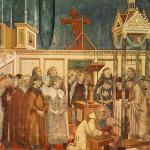Eleven years ago, I gave this sermon to my Secular Franciscan fraternity and posted it here at Vox Nova. It is one of my favorite posts on Vox Nova. In light of the my last post on Greccio, I want to share it with you again.
December 16, 2012, Gaudete Sunday
A sermon delivered to St. Joseph Fraternity, Hartford, as part of our annual Christmas Creche devotion
My brothers and sisters in Christ: may the Lord give you Peace!
Today we follow the tradition established by our Father Francis of recreating the birth of Jesus in Bethlehem, celebrating this fact in word and song. The first such celebration was in Greccio in 1223, and we have just heard the description of it by Thomas of Celano. As Celano noted, Francis himself preached to the people on that occasion. This sets the bar very high for me as I follow in his footsteps!
Celano tells us that Francis created the crèche in order to:
Recall to memory the little Child who was born in Bethlehem and set before our bodily eyes in some way the inconveniences of his infant needs. (Celano, First Life 84)
He did this so that the Gospel virtues might be seen clearly in the birth of Christ:
There simplicity was honored, poverty was exalted, humility was commended… (Celano 85)
Today I want to further explore the mysteries of the Nativity and the virtues that it illustrates. I want to do this by focusing on the actual birth of Jesus. St. Matthew tells us nothing about it: only that Jesus was born. St. Luke tells us a bit more about the birth itself: he says that
While they were there [in Bethlehem] the time came for her to have her child, and she gave birth to a son, her first born. She wrapped him in swaddling clothes and laid him in a manger. (Luke 2:6-7)
However, we do know a little more from scripture. St. John had a vision of Mary giving birth: as he wrote in the Book of Revelation:
A great sign appeared…a woman, robed with the sun…she was pregnant and in labor, crying aloud in the pangs of childbirth… (Rev 12:1-2).
Though part of a grander vision, this is surely an accurate description of the birth of Jesus, or indeed the birth of any child. Giving birth is a long and difficult process. This raises the question: who helped Mary give birth to Jesus? A woman does not give birth alone. Today in America, the process requires a obstetrician and supporting nurses, or at the very least a midwife. But in the past, and certainly in Palestine 2000 years ago, a woman would have given birth at home, attended by other women. Birth was quite literally, women’s work: men (perhaps gratefully) would have been banished to another room or outside.
Had Mary given birth at home in Nazareth, she would have been attended by her mother Anne, perhaps by her aunts or older cousins, or even by other women who lived nearby. But they all would have been mothers themselves, and could have explained to her what she was feeling, comforted her in the pain of labor, and helped her deliver her child.
But none of these women were present in Bethlehem that night. So who helped Mary give birth? Joseph? I don’t think so: as I said, the birth of a child was women’s work. So here we have Mary, a young girl (she was, perhaps, as young as 14 or 15), far from home, alone with her husband, about to give birth. Who was there to help her?
The gospel writers do not say, but it is easy to surmise who was there: perhaps the innkeeper’s wife or daughters. Maybe the Rabbi’s wife, or maybe just a few older women from the village who were considered skilled in birthing. Two or three women would have gathered in that stable. By the light of a lamp or a small fire they would have helped Mary, held her hand and wiped her brow, coached her through her contractions, and caught the infant Jesus as he came forth from her womb. These anonymous hands would have been the first to hold the infant Jesus! They did not realize the true nature of this precious child, but they would have cleaned him carefully, wrapped him in a blanket, and laid him on Mary’s breast. Their work complete, they would have gone home again. One of them probably brought the good news to Joseph that he had a son. Another would have sat for a while with Mary to make sure the bleeding had stopped, and to help Mary nurse her infant for the first time.
I call attention to these anonymous women—their names forgotten by history but surely present in Bethlehem and now blessed in Heaven—because they are a sure sign of the deeper meaning of the Incarnation. We do not know who they were, or even what their motivations were. Did they come willingly, to help a poor, frightened girl far from home? Did they come grudgingly, knowing that while it was necessary to spend the time, they would still have to be up early the next morning to care for their own families? Or did they do it for a few small coins that Joseph might have given them?
We do not know and I say that it really does not matter. What matters is that each of these women chose to be there. Each of them chose to help Mary give birth to her son. Each of them chose to be there as Jesus, the Son of God, was born into the world. Each of them chose to give of themselves to Mary, and through her to her son, Jesus. These were the first gifts given to the newborn king.
Usually, when we think of Christmas presents, we think of the Magi, who arrived some time later, bringing rich gifts of gold, frankincense and myrrh. Or, in emulation of them, we think of blessed St. Nicholas, who brought gold to the father of three young women to provide their dowries. But these were merely material objects: rich and useful, but only things. Unlike these gifts, however, these anonymous women of Bethlehem gave of themselves. They had nothing else to offer Mary: no house, no bed, just a pile of straw in a stable. But they could be there with her, helping her, sharing in her suffering and then sharing in her joy as she gave birth to a son. This was compassion, and this was love. It was not love in the modern sense of an emotional feeling, however deep and stirring. They may have felt some affection and concern for this young girl in their charge, but she was still a stranger. No, it was not what they felt, but what they did: their love for Mary was an act of will. They chose to be present, to help her, to give of themselves as she gave birth.
In this love, in this act of will, we see a reflection of the love that God has for his creation, the love which is the real meaning of the Incarnation. In the beginning, God gave us life, creating us in His image. He loved us, and asked only that we love Him in return. And though we turned away from him, he continued to love us. Moreover, he revealed His love by an act of will: to show His love he gave us of Himself. As St. John put it:
God so loved the world that he gave his only Son (John 3:16).
In the Incarnation, in the birth of Jesus, God gave of Himself to us. Jesus chose to come among us. He chose to be born an infant, son of Mary, adopted by Joseph. Jesus chose to be one with us, to share in our sufferings and our joys. Jesus chose to take upon Himself our sins.
This is what Francis wanted to commemorate at Greccio. This is why, in that Church, on Christmas Eve 1223, simplicity was honored, poverty was exalted, [and] humility was commended: because Francis set before their eyes, and we continue to set before our eyes, the sacrificial love that God has for each of us.
In the anonymous women of Bethlehem, we see this love reflected, and we are called in our lives, both at Christmas and throughout the year, to share this love with our brothers and sisters. We may give presents, perhaps even expensive ones, to friends and family this year. But as Secular Franciscans we are called, like St. Francis, to follow the teachings and the footsteps of our Lord Jesus Christ (Celano 84), then we must give of ourselves. We must love one another as Jesus loves us. We must give of ourselves by an act of will. Not when we feel like it, or when it is convenient—and it is worth remembering that babies have never come at a convenient time—but when we are needed. We must love one another, not simply by feeling, but in giving. So my prayer for all of us this Christmas season is that each of us, by the grace of Emmanuel, God dwelling with us, we might, like these anonymous, holy women of Bethlehem, offer to God the one gift we are truly able to give, and love and serve the Lord in all those we meet.
Cover image: The Nativity, anonymous Dutch painter, Metropolitan Museum of Art, donated to WikiCommons under the Creative Commons CC0 1.0 Universal Public Domain Dedication.













